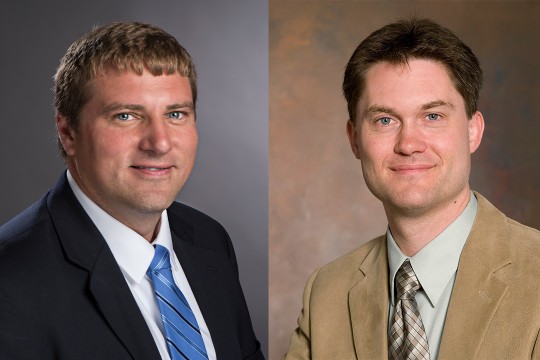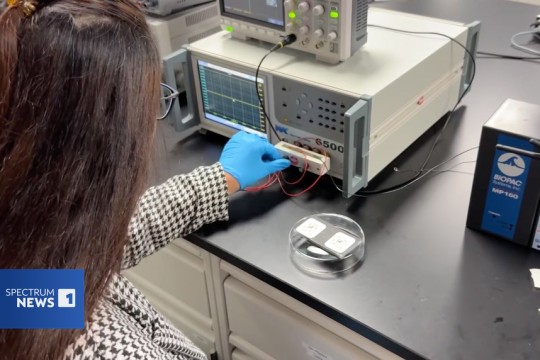News by Topic: Research
-
April 10, 2025
![headshots of two professors.]()
RIT honors two faculty members with Russell C. McCarthy Endowed Professorships
The Endowed Professorship reflects the College of Engineering Technology's faculty connections to industry and its preparation of the next generation of industry professionals.
-
April 9, 2025
![Shima Parsa is shown in a lab jacket next to text stating her name and the title of her award.]()
Parsa honored with NSF CAREER Award
Shima Parsa, assistant professor in RIT’s School of Physics and Astronomy, received an NSF CAREER Award to advance her research in soft matter physics.
-
April 9, 2025
![a college age woman in a light blue shirt sits in an office space in front of a whiteboard and shelving unit.]()
RIT student’s research prepares her for a career in neuropsychology
What began as an online study using surveys to assess cognitive reserve has since evolved into a full-scale, in-person research effort in RIT’s Neurobehavioral Lab.
-
April 7, 2025
![Researcher connects wires to lab equipment while monitoring data on a screen.]()
RIT researchers use skin model to improve wearable devices
Spectrum News features the biomimetic skin phantom technology that is a key part in the research of Krittika Goyal, assistant professor in the Department of Manufacturing and Mechanical Engineering Technology.
-
April 7, 2025
![a computer generated image of a gardener watering a large green bush in the shape of a dollar sign on a green background.]()
What Is Economic Gardening?
Inc. features RIT Venture Creations incubator company Sweet Pea.
-
April 4, 2025
![Two women sit smiling on a white couch in front of a wooden wall.]()
RIT Graduate Showcase puts students in the spotlight April 10
Graduate students Olivia Towne and Meghan Taylor gave back to the RIT community with their graduate research projects, which focused on the nutritional needs of student athletes and the challenges facing people with food allergies.
-
April 4, 2025
![Smiling scientist in lab coat standing in a laboratory with equipment and supplies.]()
Michel works to bring inclusivity to the classroom and the lab
Lea Michel’s commitment to mentorship, diversity, and hands-on learning reflects the same encouragement that once sparked her own path in STEM. She is being recognized for her impact with the 2025 Eisenhart Award for Outstanding Teaching.
-
March 28, 2025
![Journalists raise cameras during a crowded outdoor press event.]()
RIT researchers use AI to uncover surprising trends in media coverage of police
A new study from RIT and Carnegie Mellon University experts is challenging a widely held belief about the media—that local news outlets have become more critical of the police in recent years.
-
March 26, 2025
![A bearded man wearing glasses sits in a chair in front of a black wall with 'Center for Detectors' in large, bold lettering.]()
Center for Detectors reached milestone in NASA-funded project
The center is working to advance and characterize single-photon sensing CMOS image sensors to determine if they can survive the harsh radiation environments in NASA missions. A successful image was recently captured, providing a milestone in the project.
-
March 20, 2025
![Woman in a navy blazer and headwrap works on a laptop at a modern, well-lit indoor space with large windows overlooking a campus.]()
Celebrating Women’s History Month through interdisciplinary research
The inaugural Women, Gender, and Sexuality Studies symposium, hosted on March 28, will feature original work by individuals from across the RIT community.
-
March 18, 2025
![Smiling man with glasses and a beard, wearing a light gray button-up shirt, leans on a railing in a modern office space.]()
Entrepreneur, scientist, engineer Astro Teller is RIT’s Academic Convocation keynote speaker
Teller, who is widely recognized for his leadership in technological innovation, oversees X, Alphabet’s Moonshot Factory designed to help tackle the world’s most difficult problems with bold solutions. Academic Convocation is on May 9.
-
March 14, 2025
!["A group of nine people pose with awards at the PI Millionaires event, standing in front of a screen displaying the event’s name and a tiger mascot. The attendees are dressed in business or smart casual attire, holding glass trophies, and smiling.]()
RIT recognizes faculty-researchers for innovative projects and funding milestones
Researchers who contributed to RIT receiving nearly $103 million in sponsored research awards during the past fiscal year, including 10 faculty members who reached or surpassed $1 million this past fiscal year, were inducted into the yearly classes of PI Millionaires.




















